Search
Showing 10 of 522 results for group registration
-
Auckland schools build relationships with education agents and schools in Japan
For the first time, a group of 16 Auckland-based high schools collectively visited Japan.
Their aim? Engaging with education agents and local schools to explore building long-term relationships, develop student exchanges and promote study at primary and secondary schools in Auckland.
ENZ supported the delegation by hosting an event at the New Zealand Embassy in Tokyo for the school’s delegation to make local connections. Over 50 local education agents, schools and the New Zealand delegation were brought together to connect, share and learn from each other.

Representatives from Massey Highschool and Waiuku College speaking to education agents at the New Zealand Embassy event.
Mount Roskill Grammar School International Director, Wendy Reid, said the visit showed what regions can achieve with a joined-up approach.
“It was a privilege to work with so many professional and knowledgeable Auckland schools, and continue to build relationships with our Japanese partners,” Wendy said.
Feedback from partners in Japan was also positive. Ritsumeikan Uji Junior and Senior High School English Head of Department, John Headon, said the regional approach to this engagement showcased New Zealand’s strength in community spirit.
“No matter which school you visit, there’s a strong sense of reassurance that the entire region will come together to support their students,” he said.
The participating schools were Auckland Grammar, Botany Downs Secondary College, Gulf Harbour School, Howick College, Maraetai Beach School, Massey High School, Mount Albert Grammar, Mount Roskill Grammar School, One Tree Hill College, Rosehill College, Sacred Heart College, St Mary’s College, St Peter’s College, Takapuna Grammar, Waitākere College and Waiuku College.
While in Japan, the Auckland school group maximised the opportunity by independently visiting other key regions, visiting partners and meeting with prospective families.
Since their return, the group of schools has been busy following up with the new and existing partnerships.
-
Stronger together: TNZ and ENZ support school sector growth through agent famil
The week-long programme brought eight agents from mainland China, Hong Kong, and Taiwan to Wellington, Marlborough and Canterbury.
The aim was to give agents first-hand experience of New Zealand’s short-term study offerings in schools, strengthen connections with regional education providers, and explore opportunities to develop tailored study tour programmes.
The famil was funded by TNZ, with ENZ collaborating with Schools International Education Business Association of New Zealand (SIEBA) to manage the itinerary and logistics.
ENZ Senior Market Development Manager (China), Felix Ye, and TNZ Trade Development Manager (Greater China), Sandy He, led the delegation of eight agents - providing on-the-ground support and sector insights.
In the year ended December 2024 New Zealand exported $1.29 billion of education related travel to China. This represented 35.8% of all exports of education related travel. For trade in education related travel China, People's Republic of ranked 1 of 140 for highest export value. [1] According to data from Stat NZ, 7.9k Chinese students holding visitor visas came to New Zealand for short-term programmes or study tours - the majority visiting during China’s school holidays in July. [2]
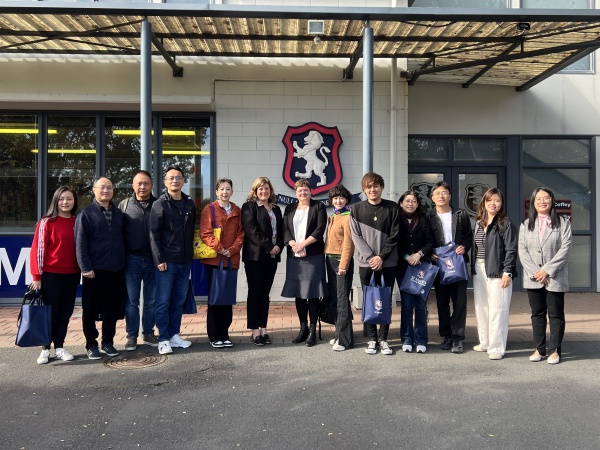
The agents visited St Mark’s School in Wellington, meeting with Erica Harrison, the Acting Principal, and her team.
The agents met with 15 schools across the three cities, including a mix of private, state-integrated, and single-sex schools. The journey began in Wellington with a warm welcome at Rāroa Normal Intermediate, where the group received a traditional mihi whakatau — a first-time experience for many.
Deputy Principal Dave Gillies said it was a great opportunity to showcase the school’s experiential learning focus.
“We’re excited about developing professional relationships with the agents and the opportunities that will grow from this visit,” he said.
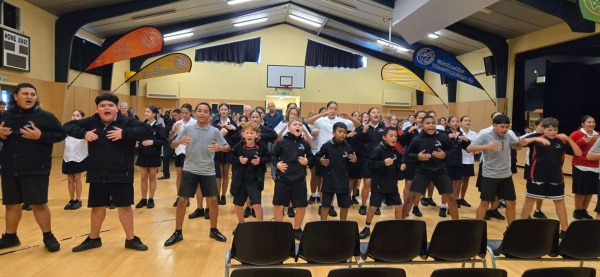
Students from Chisnallwood Intermediate School perform a haka to welcome the group to the school.
In the South Island, the group explored a range of school offerings and regional initiatives.
In Blenheim, agents gained insights into the unique characteristics of state-integrated education at Richmond View School, Marlborough Boys' College, and Marlborough Girls' College.
In Methven, Mt Hutt College showcased its tailored short-term programme, featuring sustainability-focused tourism at Ōpuke Thermal Pools and hands-on alpine and agricultural experiences – a creative integration of local resources into learning.
The famil concluded in Christchurch, where SIEBA and Christchurch Educated gave overviews of the New Zealand school system and introduced how their initiatives support the growth of international education across the sector.
ENZ Regional Director of Greater China, Dr Ron Xavier, said study tours are a growing area of interest among Chinese agents.
“This famil gave a genuine sense of what New Zealand schools can offer — from cultural experiences to hands-on learning — and helped connect agents with educators who are eager to host students,” he said.
ENZ and TNZ plan to work closely with participating partners to develop new study tours across different regions for 2026, helping raise awareness of New Zealand as an education destination for Chinese students.
SIEBA Executive Director, John van der Zwan, is looking forward to experiencing the benefits of the study tour famil.
“Study tours have significant potential, we look forward to the outcomes of this famil increasing the exposure of New Zealand’s regional schools in the China market,” he said.
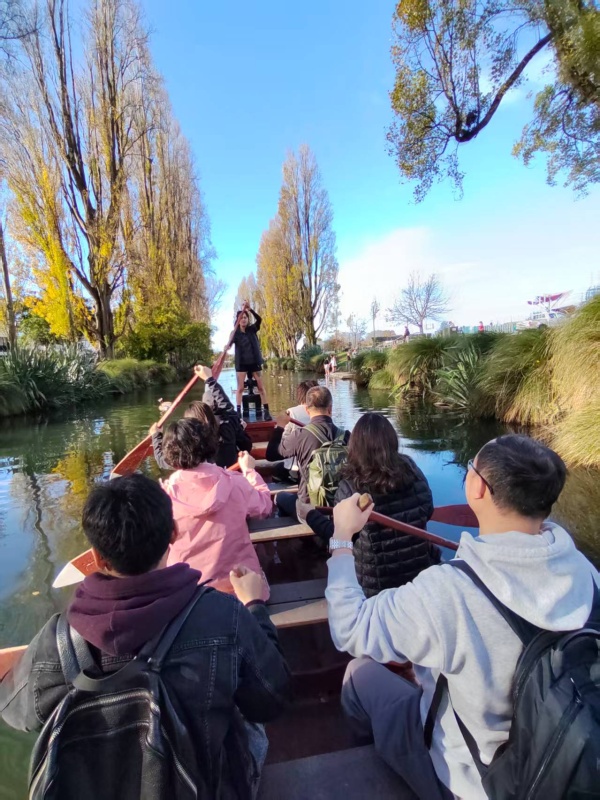
Paddling a waka on the Avon River. Beyond education, the famil also highlighted New Zealand’s unique culture and natural beauty. From visiting Te Papa and Wētā Workshop to paddling a waka on the Avon River in Ōtautahi Christchurch, agents experienced the blend of tradition and innovation that makes New Zealand a compelling destination.
[1] Tourism data | Corporate and Stats NZ
[2] https://tourismnewzealand.com/insights/tourism-data/
-
Strengthening education partnerships in Japan
The visit was led by ENZ Group General Manager for International and Sector Engagement, Sahinde Pala, and Regional Director for Asia (excluding China), Ben Burrowes, who met with partners in Tokyo, Kyoto, and Sapporo to formalise agreements and discuss future initiatives.
Renewed commitment to education collaboration with Tokyo Metropolitan Board of Education
On 20 October, ENZ renewed its Education Cooperation Arrangement (ECA) with the Tokyo Metropolitan Board of Education. First signed in 2017, the arrangement underpins collaboration on inbound and outbound study programmes and initiatives that deepen understanding of New Zealand’s education system.
The renewal included a review of past activities and discussions on future areas of cooperation, ensuring the partnership continues to deliver meaningful outcomes for students and educators.
New arrangement with Ritsumeikan Academy
On 21 October, ENZ signed a new ECA with Ritsumeikan University and its affiliated schools. Ritsumeikan is recognised for its strong focus on global competence and has maintained a close relationship with New Zealand since 2000 through long-term and exchange programmes.
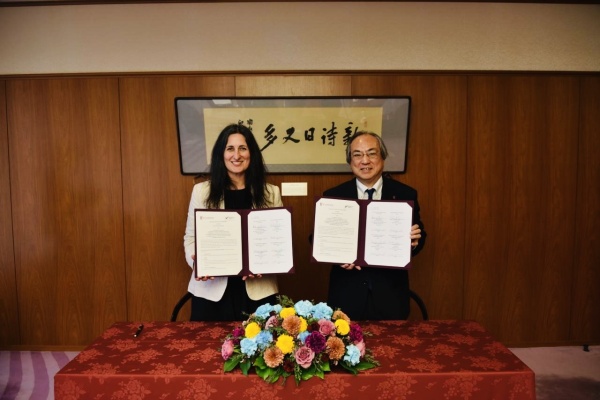
ENZ Group General Manager International & Sector Engagement, Sahinde Pala, alongside Chancellor, The Ritsumeikan Trust Presindent, Ritsumeikan University, Dr.Yoshio Nakatani.
The formalisation of this partnership builds on years of collaboration, including support for identifying partner schools and facilitating study tours. The new arrangement will strengthen opportunities for Japanese students to experience New Zealand education.
Reaffirming ties with Hokkaido Board of Education
On 22 October, ENZ met with the Hokkaido Board of Education to reaffirm a partnership that began in 2017 and was formalised through an ECA in 2020. Discussions focused on continuing reciprocal school exchanges, advancing digital learning in regional areas, and promoting cross-cultural understanding and global learning for students in both regions.
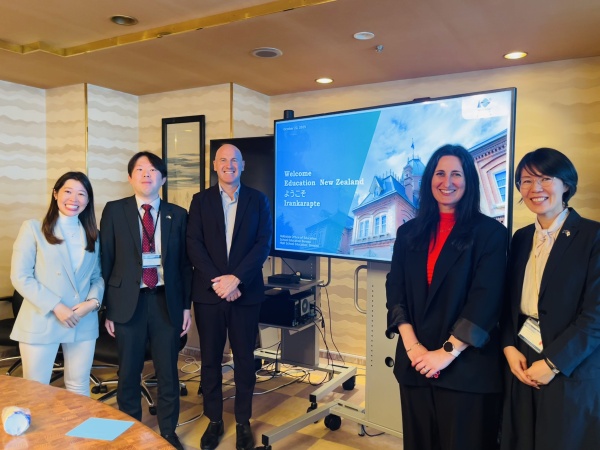
From L to R: ENZ Senior Market Development Manager Takako Tominaga, Chief Coordinator, Hokkaido Board of Education Yohei Kato, ENZ Regional Director Ben Burrowes, ENZ Group General Manager Sahinde Pala and International Exchange Section, High School Education Division, Bureau of school Education, Aoi Konagaya.
This engagement reflects ENZ’s commitment to sustaining and deepening educational exchange between Hokkaido and New Zealand.
Meeting with JAOS leadership
Also on 22 October, ENZ met with Mr. Sone, a Board Member of the Japan Association of Overseas Studies (JAOS), the peak body representing Japan’s study-abroad agencies. JAOS promotes ethical industry standards, provides counsellor training, and advocates for safe, high-quality study abroad options for Japanese students.
The discussion covered the strong reputation of New Zealand in the high school sector, emerging market dynamics, and evolving preferences among students and parents. Both sides explored opportunities for deeper collaboration with Japanese agents, including future initiatives to strengthen partnerships and enhance global learning experiences.
Looking ahead
The visit marked an important step in strengthening ENZ’s partnerships across Japan and reaffirming shared goals for international education.
Reflecting on the visit, Sahinde Pala said this visit shows ENZ’s commitment to building strong international partnerships.
“We are delighted to work with our Japanese partners to create more opportunities for students from both countries to gain global skills and for Japanese students to experience the quality of NZ's education system," she said.
-
New Zealand School Story released
The New Zealand School Story comprises a video, posters and photography available via The Brand Lab. (Head to the ‘Marketing’ tab and scroll down to ‘Sector Stories’.)
Central to all collateral is the theme ‘Proud Parents’. The video itself tells a genuine, heart-felt and emotive story about how children from all around the world can have the opportunity to flourish in our schools.
It shows we understand the importance of choosing the right study destination, especially for young children, and how much is invested in that the decision. Like the New Zealand Education Story, the School Story has a strong emotional connection, while also reinforcing key messages that promote New Zealand schools. Its target audiences are parents, as key decision-makers, as well as students.
Education New Zealand led the development of this story with guidance from an industry working group comprising the SIEBA Establishment Board and the ENZ School Sector Reference Group. Advertising agency Clemenger BBDO produced the material.
The story was launched at ENZ’s seminar series in March at locations around the country. If you haven’t seen it yet, head to The Brand Lab now and have a look.
-
NZIDRS scholarship students attend valuable workshop
Apart from being a great opportunity for these students to get to know one another, and see a bit more of New Zealand, it was also a valuable opportunity for us to learn more about what motivated them to come to New Zealand and how the experience has matched up to their expectations. We also were able to provide them with answers to some of their questions, such as work rights and visa queries.
The feedback is being collated and will be available through Universities New Zealand.
ENZ has also unearthed some marketing gold amongst the group and will be keeping in touch with them so that they can tell their great personal stories about our education system in promotional material and at events.
It was a productive and enjoyable day. One of the students surprised everyone with his impromptu viola performance of Bach and then invited all to watch him play in a jazz band in Wellington on Sunday night. Many took the opportunity to stay on for the weekend and some new friendships were made.
ENZ plans to hold similar events every three years or so to ensure each student is contacted once during their tenure in New Zealand.
Above: The group of international PhD students that participated in the NZDRS workshop (absent Justin Horn)
-
Rosehill College and Te Hihi primary school partnership thrives
Just ten minutes down the road, Te Hihi School is a full primary school in rural Karaka with around 200 students and 17 staff. Rosehill College has a well-established international student programme and Te Hihi is just starting out.
“In the past we have had the odd Korean student come to our school, but with Anne’s help we have developed an international student business plan, I’ve been to an ENZ fair in Guangzhou and we’ve hosted a study group from Taiwan,” says Kevin Bush, principal at Te Hihi School.
Anne Henwood is the Director of International Students at Rosehill College and she takes Te Hihi’s marketing material with her whenever she goes overseas.
“Our relationship with Te Hihi school is a real pleasure – and it makes good sense,” says Anne.
“As well as offering families a pathway for their child from primary to secondary education, our relationship shows we have strong connection with the local community and a serious commitment to our children.”
With a pathway through to Rosehill College, a Te Hihi School student can stay within the area and possibly with the same homestay family for the full course of their schooling in New Zealand.
Kevin has also noticed the benefit of having international students in the school on his Kiwi students.
“In August we had a year 8 short term study group come from Taiwan for five weeks – our children had their eyes opened as they got to know children from another culture. Asia is an area that they don’t get a lot of exposure to but going forward as a country, Asia is going to be important to them as adults,” says Kevin.
“The children that come to New Zealand on their own show remarkable resilience. The friendships that they make while they are here, especially if they stay on for secondary school, are likely to last a lifetime – providing valuable global connections for our children.”
In June, Anne hosted a visit by an agent from Guangzhou who spent the morning at Rosehill and the afternoon at Te Hihi.
“The agent really enjoyed her visit and it was great to show her both schools in one day, to demonstrate the strength of our working relationship and what we have to offer as a package,” says Anne.
“Back in her office in China she will have a much better understanding of our education system and everything we have to offer when she is talking to parents about sending their child to New Zealand.”
Marketing as a team is a long term proposition that will only bear fruit over time. As principal of a small rural school, Kevin is realistic about their capacity for international students.
“I’m planning for around six international students to come to Te Hihi over the next couple of years which seems like a low target but I am excited by the diversity even a small number of students will bring to our school,” says Kevin.
Anne agrees saying: “International students bring culture and diversity, as well as a willingness to learn, to be part of the whole English environment.”
“Some Rosehill students may never get the opportunity to travel so the experience they get at school with other cultures becomes very important.”
-
Manawatu hosts agents
“A successful famil tour provides a holistic experience for the agents, and gives them first-hand knowledge and experience from which to recommend Palmerston North and Manawatu to prospective students and parents,” said Lesley McDonald, Co-Chair of International Education Manawatu (IEM).
“We decided that we would split the agents into two groups – those focussed on the tertiary sector and those on the secondary sector. That way, the agents in each group could focus on their specific sector and spend more time at the relevant institutions,” said Lesley.
The agent visit was timed to coincide with the Massey University graduation ceremony, demonstrating the successful outcome of study.
To give them a taste of the Manawatu student lifestyle, the agents stayed with homestay families in the region.
“We recognised that international education is more than the study experience – it also includes a safe lifestyle, leisure activities, internship and part-time employment opportunities which lead to residency and employment.”
“The agents saw the Royal New Zealand Ballet perform at the Regent Theatre in Palmerston North and had a trip to Wellington. One agent even stayed on an extra day to take part in a tour of Wairarapa wineries!”
For the visiting agents the visit was an immersion in what it’s like to live and study in Palmerston North and the Manawatu region, and for the education providers it was a chance to showcase the best their institution and the region has to offer.
For both, it was an invaluable relationship-building experience.
“We have received very positive feedback from the visiting agents who wish to build on the relationships with the educational providers that they met and interacted with”, said Lesley.
To fund the agent visit a cross-sector group of education providers – all members of IEM – pooled their resources, with some additional funding was provided by Education New Zealand’s Regional Agent Funding programme.
-
Eighteen million views and counting
Yichen is a cartoonist with five million followers on Weibo. (Weibo is one of the most popular social media platforms in China. A mix of Twitter and Facebook, it’s used by more than 30% of Chinese internet users.)
Yichen was accompanied by a team from Sina.Com. A multimedia outlet, Sina.Com owns Sina Weibo (which hosts Yichen’s account). Its education outlet, Sina Education, was the first professional education-focused online media platform in China. An interactive campaign involving Sina Education; Yichen’s dedicated visit Weibo account and her own personal account, and ENZ’s Weibo account, ensured maximum profiling of this visit on these channels.
The group visited eight institutions in Dunedin, Otago and Queenstown to raise the profile of the South Island as a study destination.
“Yichen’s followed by millions in China for her quirky and positive cartoons and posts about life. She began sharing her work on Weibo when a student at Tianjin Normal University, and has gone from strength to strength since then. Her work is clever, creative and innovative – all qualities that speak to the way that we seek to position and profile New Zealand education,” says Regional Director – Greater China Alex Grace.
“What better way to grow awareness and build preference for New Zealand than inviting Ding Yichen and Sina.com here to truly experience studying in the South.”
From the trip, Yichen produced posts illustrating her New Zealand experiences, which have been viewed 18 million times to date, and Sina.com are publishing content about New Zealand on a specific mini site.
Alex says giving the group a taste of New Zealand’s course content by doing – rather than just showing or telling – made all the difference.
Yichen took part in an animation taster class, took a cooking class, delved into winemaking, and drew with our students.”
“I encourage providers hosting international guests to think about how they can make their visits stand out by ‘doing’, as well as telling and showing. Kiwi students learn by doing, and our guests are here to understand us and our education system better. Let’s make it memorable!” says Alex.
The trip was part of Education New Zealand’s visiting media programme, which brings international media to New Zealand from targeted print, online and broadcast organisations.
-
New Chair for English New Zealand
Ewen is Education Group Director at ICL Business School in Auckland. ENZ congratulates Ewen on his appointment and looks forward to working with him and the members of English NZ over the coming year. Ewen can be contacted at chairman@englishnewzealand.co.nz
Outgoing Chairman, Darren Conway, made a significant contribution to furthering the goals of English NZ and to influencing positive change at all levels for the English language sector. ENZ would like to thank Darren for his tireless work and wish him well in his continuing role as CEO of Languages International.
Together with the appointment of Ewen Mackenzie-Bowie, a new executive committee for English New Zealand was appointed:
-
Tim Brown, CEO The Campbell Institute
-
Kim Harase, Director of Marketing, Academic Colleges Group
-
Maureen Hayes, Principal and Managing Director of Worldwide School of English
-
Giuliana Silviera, Principal, Kaplan International Auckland
ENZ looks forward to continuing its work with English NZ to grow the English language sector in New Zealand.
-
-
International students in Dunedin get connected
‘Get Connected’ was a networking evening to launch the Job Ready Programme, which prepares international students for the transition from study to work through improving their skills and confidence in approaching prospective employers.
Job Ready is a free, extracurricular programme designed for any tertiary international student studying in the Dunedin region. The aim of the programme is to give participants an in-depth understanding of working culture and expectations in New Zealand, and to help them develop skills that will aid them in New Zealand workplaces.
“For many International students in New Zealand, networking is a scary and foreign business practice,” says Job Ready Coordinator, Madison Stumbles. “We wanted to create a new cultural norm – for students and businesses – where networking isn’t scary and international students have the confidence to engage with businesses looking to utilise the skills they have to offer.”
The programme has been developed with the support of ENZ’s Regional Partnership Programme, Enterprise Dunedin, Otago Polytechnic, the University of Otago and the Otago Chamber of Commerce.
The event saw 15 international Job Ready ‘graduates’ engage with the potential employers in a positive and enriching atmosphere. The Minister of Immigration, Hon Michael Woodhouse, delivered the keynote speech and was joined by Education New Zealand’s Greg Scott and Enterprise Dunedin’s Export Education Coordinator, Sarah Gauthier and representatives of Dunedin’s international education providers.
A strong turnout at the event demonstrated the level of commitment to international education in the city, and the strong understanding among all attendees of the way in which the Job Ready Programme can support local businesses in globalising their operations by creating links to skilled, international talent.

Job Ready Graduate with PhD student and AD Instruments representative, Pramuk Perera.
About the programme
In the lead up to the event, a pilot group of 15 international students from Otago Polytechnic and the University of Otago underwent the six-week intensive Job Ready programme.
Confidence building was the main focus over the six weeks, with a strong emphasis placed on enabling the students to polish their professional networking skills. Several interactive seminars were facilitated by members of the Dunedin business and education community, with one popular session on ‘How to network’ led by Gallaway Cook Allan’s, Chief Executive Officer, Matthew Gorman.
At the end of the six-week programme, students were proactively arranging meetings to talk to professionals with business interests in their field of study, and two had successfully secured employment for the following year.
With more study ahead of them, the remainder of the students credited the Job Ready Programme with boosting their confidence in finding work in New Zealand after graduation.
“I got what I needed out of this programme – confidence, knowledge [and] a better network of potential employers,” said one participant.
“I would like to thank those who made this programme successful as it has given us a good insight into skills and abilities to work on, which are not usually taught in university,” stated another.
Feedback from business participants was also incredibly positive. “I overheard Roger Belton from Southern Clams commenting on how these students were so capable, and on how they could help their businesses grow into new markets,” said Sarah Gauthier, Export Education Coordinator. “He really enjoyed meeting the students and hearing how their international business skills and multiple language abilities would help his business grow into places like Thailand and Malaysia.”
Local Dunedin businesses represented at the event included ADInstruments, Southern Clams, PocketSmith, Mixbit, Myth, Firebrand, ANZ and Cook Wong Accountants. There was also international business representation from the Carraway Group, a Hong Kong-based financial services firm.

Job Ready Coordinator Madison Stumbles with Minister Woodhouse as they presented each student with their frame able Job Ready completion certificate, signed by Dunedin Mayor Dave Cull.
Next steps
Planning for the next phase of the project is underway, with the next six-week programme being open to all international tertiary students in Dunedin and having an even stronger focus on engagement with local businesses.
“I am really looking forward to see what phase two can do for Dunedin’s international students,” said Sarah Gauthier. “Secondary school engagement will be a priority and Job Ready intends to utilise the support received in the first phase to develop comprehensive material that will be applicable to all businesses and international students in New Zealand.”
Think you’d like to do something similar in your region? Sarah, Madison, and the Job Ready Programme partners are only too happy to share their learnings and provide hints and tips from their experience.
Email Sarah in the first instance: sarah.gauthier@dcc.govt.nz

